- Home
- W. Bruce Cameron
A Dog's Purpose
A Dog's Purpose Read online
A DOG’S PURPOSE
A DOG’S PURPOSE
W. BRUCE CAMERON
A TOM DOHERTY ASSOCIATES BOOK
NEW YORK
Table of Contents
Title
Copyright
Dedication
Acknowledgments
Chapter One
Chapter Two
Chapter Three
Chapter Four
Chapter Five
Chapter Six
Chapter Seven
Chapter Eight
Chapter Nine
Chapter Ten
Chapter Eleven
Chapter Twelve
Chapter Thirteen
Chapter Fourteen
Chapter Fifteen
Chapter Sixteen
Chapter Seventeen
Chapter Eighteen
Chapter Nineteen
Chapter Twenty
Chapter Twenty-One
Chapter Twenty-Two
Chapter Twenty-Three
Chapter Twenty-Four
Chapter Twenty-Five
Chapter Twenty-Six
Chapter Twenty-Seven
Chapter Twenty-Eight
Chapter Twenty-Nine
Chapter Thirty
Chapter Thirty-One
Chapter Thirty-Two
This is a work of fiction. All of the characters, organizations, and events portrayed in this novel are either products of the author’s imagination or are used fictitiously.
A DOG’S PURPOSE
Copyright © 2010 by W. Bruce Cameron
All rights reserved.
A Forge Book
Published by Tom Doherty Associates, LLC
175 Fifth Avenue
New York, NY 10010
www.tor-forge.com
Forge® is a registered trademark of Tom Doherty Associates, LLC.
ISBN 978-0-7653-2626-3
First Edition: July 2010
Printed in the United States of America
0 9 8 7 6 5 4 3 2 1
TO CATHRYN
For doing everything, for being everything
{ ACKNOWLEDGMENTS }
So many people have helped me in so many ways to get me from where I started to where I am today, I hardly know where to begin the task of identifying them all—and where to stop is even more perplexing a choice. So let me state for the record that I know that as both a writer and a person I am a work in progress who thus far is a sum of all I’ve learned and experienced, and that I owe everything to the people who have taught me, helped me, and supported me.
I do want to make sure I acknowledge some of the writings I used in my research into how dogs think. Dogwatching, by Desmond Morris. What the Dogs Have Taught Me, by Merrill Markoe. The Hidden Life of Dogs, by Elizabeth Marshall Thomas. Search and Rescue Dogs, by the American Rescue Dog Association. The works of Cesar Millan, James Herriot, Dr. Marty Becker, and Gina Spadafori.
I wouldn’t be anything without the support of my family, especially my parents, who have always believed in my writing despite a couple of decades’ worth of rejection notices.
Also believing in me is my agent, Scott Miller, at Trident Media, who never gave up, not on this book, not on me.
Scott’s efforts led me to Tor/Forge and my editor, Kristin Sevick, whose faith in A Dog’s Purpose, combined with a careful eye and an expert touch, refined and improved this novel. She and everyone else at Tor/Forge have been a delight to work with.
As I write these words, this book hasn’t yet gone to press, and already there are so many people working to support it. Sheryl Johnston, who is a great publicist and a terror behind the wheel. Lisa Nash, who reached out to her vast network to help validate the voice of this book. Buzz Yancey, who tried to create, well, buzz. Hillary Carlip, who took on the task of redesigning wbrucecameron.com and created adogspurpose.com and succeeded so fabulously. Amy Cameron, who applied her years of teaching experience to the task of writing a study guide for any educator who wants to use A Dog’s Purpose in the classroom. Geoffery Jennings, bookseller extraordinaire, who gave an early draft his thumbs-up. Lisa Zupan, who gets it.
Thanks to all the editors who carry my column in their newspapers, despite the turmoil in the industry. Thanks especially to The Denver Post, which picked me up after the sad demise of the Rocky Mountain News. Thanks, Anthony Zurcher, for doing such a great job editing my column for all these years.
Thanks to Brad Rosenfeld and Paul Weitzman at Preferred Artists, for preferring me, and to Lauren Lloyd, for managing everything.
Thanks, Steve Younger and Hayes Michael, for all the legal work—I still think we should plead insanity.
Thanks, Bob Bridges, for continuing his volunteer work on my column’s mistakes and typos. I wish I could afford to pay you one hundred times your current salary.
Thanks, Claire LaZebnik, for coming out on the ledge to talk to me about writing.
Thanks, Tom Rooker, for whatever the heck it is that you’re doing.
Thanks to Big Al and Evie, for investing themselves in my “genius” career. Thanks, Ted, Maria, Jakob, Maya, and Ethan, for admiring my pants.
Thanks to everyone in the National Society of Newspaper Columnists, for trying to keep us all off the endangered species list.
Thanks, Georgia Lee Cameron, who introduced me to the world of dog rescue.
Thanks, Bill Belsha, for the work you did on my head.
Thanks, Jennifer Altabef, for being there when I needed you.
Thanks, Alberto Alejandro, for almost single-handedly making me a bestselling author.
Thank you, Kurt Hamilton, for motivating me to make sure there was nothing seriously wrong with the pipes.
Thanks to Julie Cypher, for loaning me everything she owns.
Thanks, Marcia Wallace, you are my favorite action figure.
Thanks, Norma Vela, for all the horse sense.
Thanks, Molly, for the car ride, and Sierra, for letting it happen.
Thanks, Melissa Lawson, for providing the final cut.
Thanks, Betsy, Richard, Colin, and Sharon, for showing up for everything and for trying to teach me how to dance the rumba.
The very first person I told this story to was Cathryn Michon. Thank you, Cathryn, for insisting that I write A Dog’s Purpose immediately, and for everything else.
Now I understand why so many people are still talking when the music plays at the Academy Awards: the list of individuals I want to thank is simply endless. So let me just stop here, ending with one final note: I want to acknowledge the sacrifice and tireless hard work of the many men and women who work in animal rescue, helping lost, abandoned, and abused pets find new and happy lives with loving families. You are all angels.
A DOG’S PURPOSE
{ ONE }
One day it occurred to me that the warm, squeaky, smelly things squirming around next to me were my brothers and sister. I was very disappointed.
Though my vision had resolved itself only to the point where I could distinguish fuzzy forms in the light, I knew that the large and beautiful shape with the long wonderful tongue was my mother. I had figured out that when the chill air struck my skin it meant she had gone somewhere, but when the warmth returned it would be time to feed. Often finding a place to suckle meant pushing aside what I now knew was the snout of a sibling seeking to crowd me out of my share, which was really irritating. I couldn’t see that my brothers and sister had any purpose whatsoever. When my mother licked my stomach to stimulate the flow of fluids from under my tail, I blinked up at her, silently beseeching her to please get rid of the other puppies for me. I wanted her all to myself.
Gradually, the other dogs came into focus, and I grudgingly accepted their presence in the nest. My nose soon told me I had one sis
ter and two brothers. Sister was only slightly less interested in wresting with me than my brothers, one of whom I thought of as Fast, because he somehow always moved more quickly than I could. The other one I mentally called Hungry, because he whimpered whenever Mother was gone and would suckle her with an odd desperation, as if it were never enough. Hungry slept more than my siblings and I did, so we often jumped on him and chewed on his face.
Our den was scooped out underneath the black roots of a tree, and was cool and dark during the heat of the day. The first time I tottered out into the sunlight, Sister and Fast accompanied me, and naturally Fast shoved his way to the front.
Of the four of us, only Fast had a splash of white on his face, and as he trotted jauntily forward this patch of fur flashed in the daylight. I’m special, Fast’s dazzling, star-shaped spot seemed to be declaring to the world. The rest of him was as mottled and unremarkably brown and black as I was. Hungry was several shades lighter and Sister shared Mother’s stubby nose and flattened forehead, but we all looked more or less the same, despite Fast’s prancing.
Our tree was perched on a creek bank, and I was delighted when Fast tumbled head over heels down the bank, though Sister and I plummeted with no more grace when we tried to make the same descent. Slippery rocks and a tiny trickle of water offered wonderful odors, and we followed the wet trail of the creek into a moist, cool cave—a culvert with metal sides. I knew instinctively that this was a good place to hide from danger, but Mother was unimpressed with our find and hauled us unceremoniously back to the Den when it turned out our legs weren’t powerful enough to enable us to scale back up the bank.
We had learned the lesson that we couldn’t return to the nest on our own when we went down the bank, so as soon as Mother left the nest we did it again. This time Hungry joined us, though once he was in the culvert he sprawled in the cool mud and fell asleep.
Exploring seemed like the right thing to do—we needed to find other things to eat. Mother, getting impatient with us, was standing up when we weren’t even finished feeding, which I could only blame on the other dogs. If Hungry weren’t so relentless, if Fast weren’t so bossy, if Sister didn’t wiggle so much, I knew Mother would hold still and allow us to fill our bellies. Couldn’t I always coax her to lie down, usually with a sigh, when I reached up for her while she stood above us?
Often Mother would spend extra time licking Hungry while I seethed at the injustice.
By this time, Fast and Sister had both grown larger than I—my body was the same size, but my legs were shorter and stubbier. Hungry was the runt of the litter, of course, and it bothered me that Fast and Sister always abandoned me to play with each other, as if Hungry and I belonged together out of some sort of natural order in the pack.
Since Fast and Sister were more interested in each other than the rest of the family, I punished them by depriving them of my company, going off by myself deep into the culvert. I was sniffing at something deliciously dead and rotten one day when right in front of me a tiny animal exploded into the air—a frog!
Delighted, I leaped forward, attempting to pounce on it with my paws, but the frog jumped again. It was afraid, although all I wanted to do was play and probably wouldn’t eat it.
Fast and Sister sensed my excitement and came stampeding into the culvert, knocking me over as they skidded to a stop in the slimy water. The frog hopped and Fast lunged at it, using my head as a springboard. I snarled at him, but he ignored me.
Sister and Fast fell all over themselves to get at the frog, who managed to land in a pool of water and kick away in silent, rapid strokes. Sister put her muzzle in the pond and snorted, sneezing water over Fast and me. Fast climbed on her back, the frog—my frog!—forgotten.
Sadly, I turned away. It looked as though I lived in a family of dimwits.
I was to think of that frog often in the days that followed, usually just as I drifted off to sleep. I found myself wondering how it would have tasted.
More and more frequently, Mother would growl softly when we approached, and the day she clicked her teeth together in warning when we came at her in a greedy tumble I despaired that my siblings had ruined everything. Then Fast crawled to her, his belly low, and she lowered her snout to him. He licked her mouth and she rewarded him by bringing up food, and we rushed forward to share. Fast pushed us away, but we knew the trick, now, and when I sniffed and licked my mother’s jaws she gave me a meal.
At this point we had all become thoroughly familiar with the creek bed, and had tracked up and down it until the whole area was redolent with our odors. Fast and I spent most of our time dedicated to the serious business of play, and I was beginning to understand how important it was to him for the game to wind up with me on my back, his mouth chewing my face and throat. Sister never challenged him, but I still wasn’t sure I liked what everyone seemed to assume was the natural order of our pack. Hungry, of course, didn’t care about his status, so when I was frustrated I bit his ears.
One afternoon I was drowsily watching Sister and Fast yank on a scrap of cloth they’d found when my ears perked up—an animal of some kind was coming, something large and loud. I scrambled to my feet, but before I could race down the creek bed to investigate the noise Mother was there, her body rigid with warning. I saw with surprise that she had Hungry in her teeth, carrying him in a fashion that we’d left behind weeks ago. She led us into the dark culvert and crouched down, her ears flat against her head. The message was clear, and we heeded it, shrinking back from the tunnel opening in silence.
When the thing came into view, striding along the creek bed, I felt Mother’s fear ripple across her back. It was big, it stood on two legs, and an acrid smoke wafted from its mouth as it shambled toward us.
I stared intently, absolutely fascinated. For reasons I couldn’t fathom I was drawn to this creature, compelled, and I even tensed, preparing to bound out to greet it. One look from my mother, though, and I decided against it. This was something to be feared, to be avoided at all costs.
It was, of course, a man. The first one I’d ever seen.
The man never glanced in our direction. He scaled the bank and disappeared from view, and after a few moments Mother slid out into the sunlight and raised her head to see if the danger had passed. She relaxed, then, and came back inside, giving each of us a reassuring kiss.
I ran out to see for myself, and found myself disheartened when all that remained of the man’s presence was a lingering scent of smoke in the air.
Over and over again the next few weeks, Mother reinforced the message we’d learned in that culvert: Avoid men at all costs. Fear them.
The next time Mother went to hunt, we were allowed to go with her. Once we were away from the security of the Den, her behavior became timid and skittish, and we all emulated her actions. We steered clear of open spaces, slinking along next to bushes. If we saw a person, Mother would freeze, her shoulders tense, ready to run. At these times Fast’s patch of white fur seemed as obtrusive as a bark, but no one ever noticed us.
Mother showed us how to tear into the filmy bags behind houses, quickly scattering inedible papers and revealing chunks of meat, crusts of bread, and bits of cheese, which we chewed to the best of our ability. The tastes were exotic and the smells were wonderful, but Mother’s anxiety affected all of us, and we ate quickly, savoring nothing. Almost immediately Hungry brought up his meal, which I thought was pretty funny until I, too, felt my insides gripped in a powerful spasm.
It seemed to go down easier the second time.
I’d always been aware of other dogs, though I’d never personally met any except those in my own family. Sometimes when we were out hunting they barked at us from behind fences, most likely jealous that we were trotting around free while they were imprisoned. Mother, of course, never let us approach any of the strangers, while Fast usually bristled a little, somehow insulted that anybody would dare call out to us while he lifted his leg on their trees.
Occasionally I even saw a dog in a
car! The first time this happened I stared in wonderment at his head hanging out the window, tongue lolling out. He barked joyously when he spotted me, but I was too astounded to do anything but lift my nose and sniff in disbelief.
Cars and trucks were something else Mother evaded, though I didn’t see how they could be dangerous if there were sometimes dogs inside them. A large, loud truck came around frequently and took away all the bags of food people left out for us, and then meals would be scarce for a day or two. I didn’t like that truck, nor the greedy men who hopped off it to scoop up all the food for themselves, despite the fact that they and their truck smelled glorious.
There was less time for play, now that we were hunting. Mother snarled when Hungry tried to lick her lips, hoping for a meal, and we all got the message. We went out often, hiding from sight, desperately searching for food. I felt tired and weak, now, and didn’t even try to challenge Fast when he stood with his head over my back, thrusting his chest at me. Fine, let him be the boss. As far as I was concerned, my short legs were better suited for the low, slinking run our mother had taught us anyway. If Fast felt he was making some sort of point by using his height to knock me over, he was fooling himself. Mother was the dog in charge.
There was barely room for all of us underneath the tree now, and Mother was gone for longer and longer periods of time. Something told me that one of these days she wouldn’t come back. We would have to fend for ourselves, Fast always pushing me out of the way, trying to take my share. Mother wouldn’t be there to look after me.
I began to think of what it would be like to leave the Den.
The day everything changed began with Hungry stumbling into the culvert to lie down instead of going on the hunt, his breathing labored, his tongue sticking out of his mouth. Mother nuzzled Hungry before she left, and when I sniffed at him his eyes remained shut.
Over the culvert was a road, and along the road we’d once found a large dead bird, which we’d all torn into until Fast picked it up and ran off with it. Despite the danger of being seen, we tended to range up and down this road, looking for more birds, which was what we were doing when Mother suddenly raised her head in alarm. We all heard it the same instant: a truck approaching.
-->

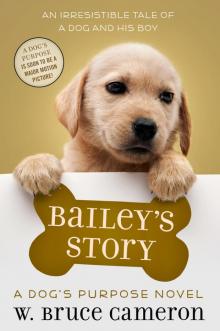 Bailey's Story: A Dog's Purpose Novel
Bailey's Story: A Dog's Purpose Novel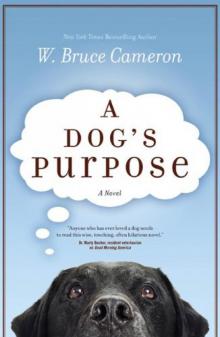 A Dog's Purpose
A Dog's Purpose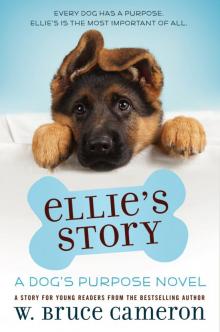 Ellie's Story
Ellie's Story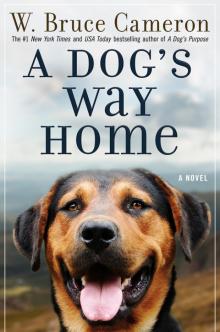 A Dog's Way Home
A Dog's Way Home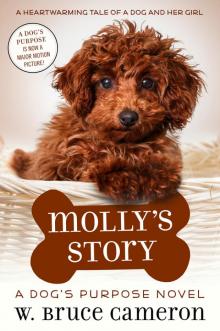 Molly's Story
Molly's Story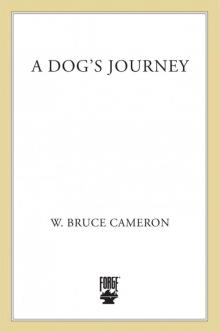 A Dog's Journey
A Dog's Journey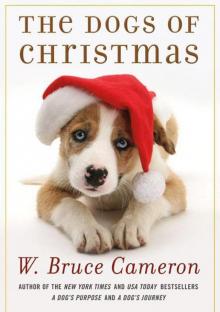 The Dogs of Christmas
The Dogs of Christmas A Dog's Perfect Christmas
A Dog's Perfect Christmas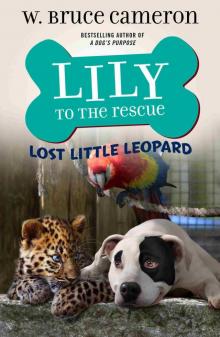 Lily to the Rescue: Lost Little Leopard
Lily to the Rescue: Lost Little Leopard Bella's Story
Bella's Story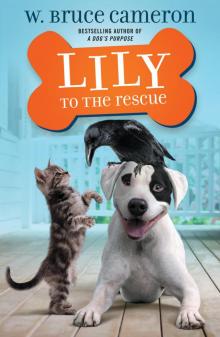 Lily to the Rescue
Lily to the Rescue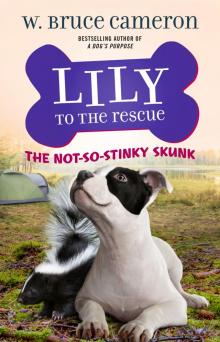 Lily to the Rescue: The Not-So-Stinky Skunk
Lily to the Rescue: The Not-So-Stinky Skunk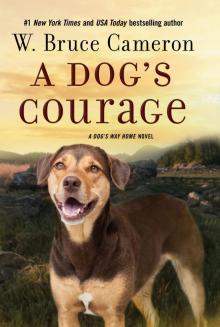 A Dog's Courage--A Dog's Way Home Novel
A Dog's Courage--A Dog's Way Home Novel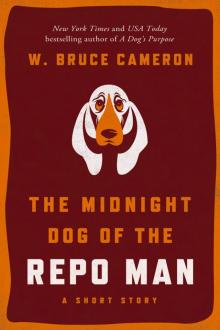 The Midnight Dog of the Repo Man
The Midnight Dog of the Repo Man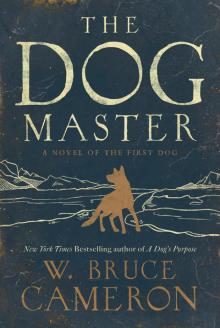 The Dog Master: A Novel of the First Dog
The Dog Master: A Novel of the First Dog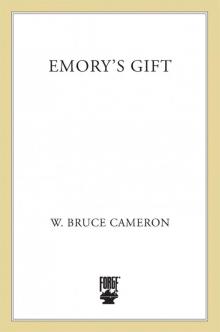 Emory's Gift
Emory's Gift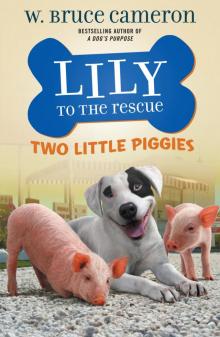 Lily to the Rescue: Two Little Piggies
Lily to the Rescue: Two Little Piggies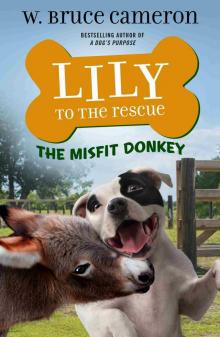 Lily to the Rescue: The Misfit Donkey
Lily to the Rescue: The Misfit Donkey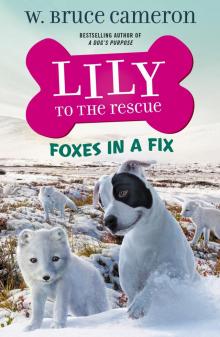 Lily to the Rescue: Foxes in a Fix
Lily to the Rescue: Foxes in a Fix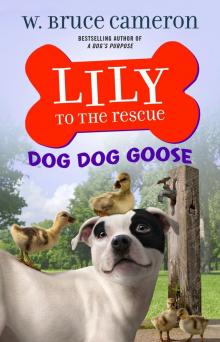 Lily to the Rescue: Dog Dog Goose
Lily to the Rescue: Dog Dog Goose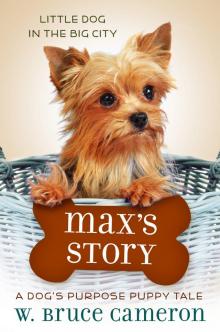 Max's Story
Max's Story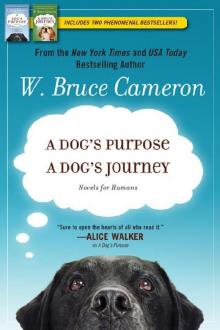 A Dog's Purpose Boxed Set
A Dog's Purpose Boxed Set Toby's Story
Toby's Story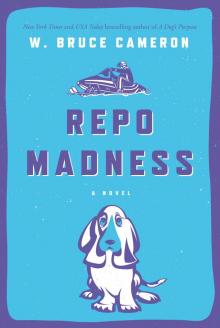 Repo Madness
Repo Madness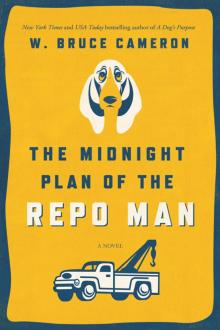 The Midnight Plan of the Repo Man
The Midnight Plan of the Repo Man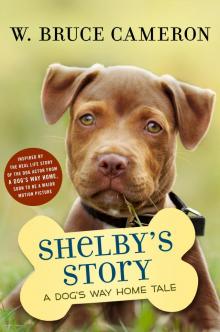 Shelby's Story
Shelby's Story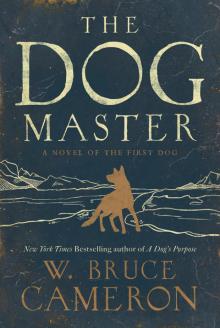 The Dog Master
The Dog Master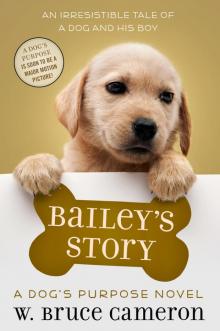 Bailey's Story
Bailey's Story